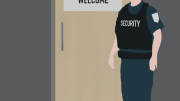While many students choose to take out hefty student loans or balance a part time job with school, thousands of students each year choose a more complicated path to higher education through the Canadian Forces.
Master Warrant Officer Paul Lucas explained that the Canadian Forces offers a program for students in Grade 12 or first/second-year university called the Regular Officer Training Plan.
The Regular Officer Training Plan is essentially a nine-year contract an interested student signs with the military. The contrast is fulfilled when the student completes four years of undergraduate study, receiving their degree, and five years of service in the Canadian Forces, says Lucas.
While a student is in university completing their first four years of the contract, they receive a salary of approximately $1,590 a month. Lucas added that their university tuition is paid for, in addition to all textbooks and materials related to their study.
Upon completing the university component a student would enter the Canadian Forces, launching into a job relating to their field of study, with a starting salary of $56,000 a year.
Students in the Regular Officer Training Plan are considered a part of the Canadian Forces and receive the same benefits offered to other members, such as free health and dental coverage.
Lucas approximates that 12,000 to 14,000 students apply in any given year for the Regular Officer Training Plan, but only 400 to 500 positions are available.
“The important thing for students to know is that this is just an option. It’s another option to consider because the more options you have the better off you are,” says Lucas.
University-military relationships can be found across Canada, but the very first one was started right here at the University of Manitoba, about 36 years ago.
Kent Pearce, coordinator of the University of Manitoba’s Military Support Office, explained that people who are in the military often wish to advance their education and that the Military Support Office assists with this.
Pearce says that the members of the military receive high levels of training that are very academic and work intensive. Therefore, after the Military Support Office has examined the work and training, up to 30 credit hours can be awarded.
The Military Support Office determines how many credit hours a military student is eligible to receive by going over their Military Personnel Resume Report.
Pearce pointed out that before the credit hours are added to their transcript they need to complete six credit hours of study.
The Military Support Office recognizes that being a military student is very different from being a civilian student, and so the Military Support Office attempts to help military students with the unique challenges they might face.
Pearce explained that the Military Support Office can help a student withdraw from courses without academic or financial penalty if they are suddenly called to duty. The office can also help military students easily transfer between different universities as their stationing changes.
Pearce says that there are approximately 500 active military students currently enrolled at the university.
In the 36 years since the university-military relationship began, 10,000 military students have either taken a course or done some form of study at the University of Manitoba. Sixteen thousand military students have graduated with degrees.
Pearce adds that one such graduate is Ray Henault, the former chief of the defence staff.
George MacLean, department head of political studies, explained that there are many different forms of reimbursement and various programs that are offered to members in the Canadian Forces because the Forces are made up of professionals rather then drafted members.
The Canadian Forces try to provide value to their members by offering opportunities for advancement in education.
Most of the people that go into the Forces are only going to stay in the Forces for a portion of their professional career before they go off to work in the private or public sector, says MacLean.
Providing an asset like education appeals to Canadians to become apart of the military because it offers them options for another career once they are finished with their service.
MacLean says that, in contrast, there are some people who spend their entire careers in the Forces, and since the early 1990s certain ranks are required to hold a degree.The purpose of this requirement is to expand the knowledge base, expertise and competency of senior members of the Canadian Forces.
MacLean points out how much of a challenge it would be for members of the military to work full time in a challenging environment, while being expected to do university courses.
He suspects that without education programs and reimbursements, the military would have a harder time recruiting top-notch young people because it would be too costly and challengingly to be in the military and be a student.
Military students add diversity to the student body, bringing a new perspective to the university because often times they have been to the prominent world issues being discussed in class, said Maclean.
“I can tell you that at a grassroots level I’ve had students in my classes who are taking the courses through distance education, and they’re submitting papers to me while in the field in Afghanistan,” MacLean recalled.
The political science department has a scholarship setup in the name of Cpl. Jordan Anderson, a member of the Canadian Forces and a student at the University of Manitoba, who was killed in Afghanistan in 2007.




